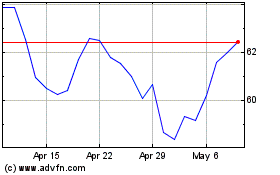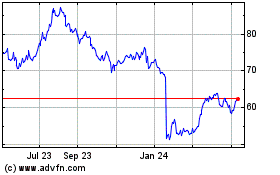U.S. Farm Sector Looks Warily at China Tariff Threats
March 21 2018 - 5:13PM
Dow Jones News
By Jacob Bunge and Benjamin Parkin
Shares in grain trading firms fell Wednesday amid growing
concern the Trump administration's tougher trade policies will
provoke China to punish U.S. farmers.
Shares of Bunge Ltd., the world's largest soybean processor,
declined 1.3%, while Archer Daniels Midland Co. fell 0.8% after The
Wall Street Journal reported Chinese officials are considering
tariffs on soybeans, sorghum and hogs imported from the U.S. ADM
and Bunge are two of the world's largest soybean shippers, and
China is far and away the world's biggest buyer.
China may not be able to slow purchases of U.S. soybeans for
long, according to analysts at Vertical Group, a banking and
research firm. The country is by far the world's biggest soybean
importer, and its need for soybeans to feed expanding livestock
operations is likely too insatiable to be met exclusively by
farmers in South America, a top U.S. rival.
Reducing China's reliance on U.S. hog farmers could be easier.
The country only imported about $10 million of swine from the U.S.
last year. And while China buys about 6% of all exported pork, its
farmers have been building up their herds, a supply surge that has
pushed hog prices in China 25% to 30% lower over the past three
months, Vertical Group estimated. Restricting pork shipments from
the U.S. could impact big processors such as Tyson Foods Inc.,
Hormel Foods Corp. and Smithfield Foods Inc., owned by China-based
WH Group.
Concerns that China could curtail its buying of U.S.
agricultural goods has already weighed on crop and livestock
markets in recent weeks. Lean hog futures fell almost 10% over the
past week. Soybean futures have also fallen.
"Bottom line, we're terrified," said Brian Grossman, a market
strategist at Zaner Group in Chicago who used to farm in North
Dakota. "It's not going to be good for the American farmer."
Even a temporary halt in trading with China could have major
ramifications for prices and U.S. farmers, Mr. Grossman said.
American farmers are expected to plant as many acres of soybeans as
corn this year for the first time in 35 years. If less of that is
exported, analysts say domestic stocks could grow to record levels
by the end of this crop year.
U.S. farmers were already bracing for another difficult year.
The U.S. Department of Agriculture expects farm incomes to hit
their lowest level since 2006, extending a prolonged slump that has
forced some farmers out of business. Soybean prices are 42% below
their 2012 peak.
Shane Hanna, who farms 1,400 acres in Delphi, Ind., fears his
profit margins could be squeezed further if export disruptions push
soybean prices down more. "It will be insult to injury," he
said.
Mr. Hanna said he is also concerned about his neighbors who
raise hogs. Diminished pork exports to China could result in
reduced demand for soybeans to turn into animal feed.
"We need the pigs to eat what we produce," he said.
--Jesse Newman contributed to this article.
Write to Jacob Bunge at jacob.bunge@wsj.com and Benjamin Parkin
at Benjamin.Parkin@wsj.com
(END) Dow Jones Newswires
March 21, 2018 16:58 ET (20:58 GMT)
Copyright (c) 2018 Dow Jones & Company, Inc.
Archer Daniels Midland (NYSE:ADM)
Historical Stock Chart
From Mar 2024 to Apr 2024

Archer Daniels Midland (NYSE:ADM)
Historical Stock Chart
From Apr 2023 to Apr 2024
